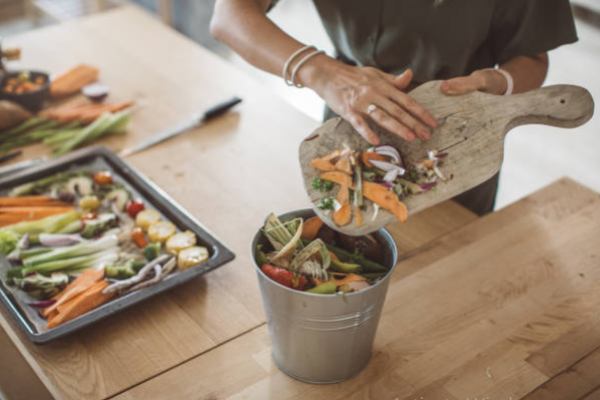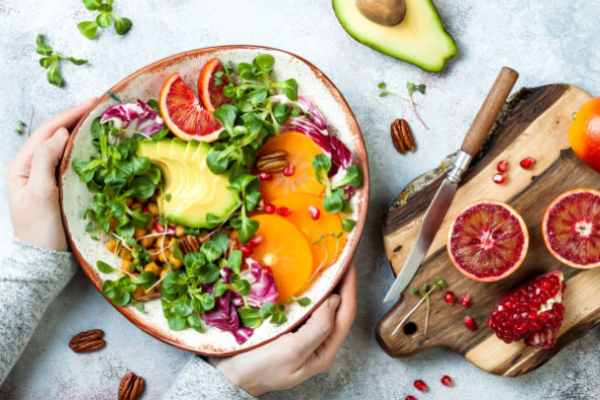The raw food diet has existed for a long time, but in recent years it has grown very much in popularity.
Its proponents believe that the consumption of mostly raw foods is ideal for human health and that it has numerous benefits, including weight loss and better overall health.
However, health experts warn that eating exclusively raw diets can lead to negative health consequences.
In the continuation of the article, learn all about the raw diet for beginners: what are the good and bad sides, how raw diet strains your health, and a menu for a week that you can start today.
What is a raw diet?
A raw diet or raw veganism, often referred to as the raw diet or “raw diet,” consists of mostly or completely raw and unprocessed foods.
Food is considered raw if it has never been heated to a temperature of 40– 48 ° C.
It should also not be refined, pasteurized, treated with pesticides or otherwise processed. Instead, the diet allows for several alternative preparation methods, like juices or mixing smoothies.
Similar to veganism, a raw diet is usually plant-based, and consists mainly of fruits, vegetables, nuts and seeds.
Although most raw food diets are entirely plant-based, some people also consume raw eggs and dairy products.
Less often, raw fish and meat can also be included. In addition, taking supplements is usually discouraged in a raw food diet.
Supporters often claim that diet will give you all the nutrients you need, and believe that cooking food is harmful to human health because it destroys natural enzymes in foods, reduces their nutrient content, and reduces the “life force” they believe exists in all raw or “live” foods.
People follow a raw diet because of the benefits they believe it has, including weight loss, improved vitality, increased energy, improved chronic diseases, improve overall health, and reduced environmental impact.
How to start with a raw diet?
To follow a raw diet, make sure that at least 75% of the food you eat is raw.
Most raw food diets consist primarily of fruits, vegetables, nuts and seeds. Cereals and legumes are also often allowed, but they usually need to be soaked or germinated before you eat them.
Foods to eat
- All fresh fruit
- All raw vegetables
- Raw nuts and seeds
- Raw cereals and legumes, germinated or soaked
- Dried fruits and meat
- Nut milk
- Nut butters
- Cold pressed coconut and olive oils
- Fermented foods such as kimchi and sauerkraut
- Algae
- Sprouts
- If desired, raw eggs or dairy products
- If desired, raw meat or fish
Foods to avoid
- Boiled fruits, vegetables, meat and cereals
- Baking
- Fried nuts and seeds
- Refined oils
- Table salt
- Refined sugars and flour
- Pasteurized juices and dairy products
- Coffee and tea
- Alcohol
- Pasta
- Pastries
- Chips
- Other processed foods and snacks
Is raw food healthier than cooked?
Supporters of the raw diet believe that eating mostly or all raw food is ideal for human health. However, like many of the core beliefs behind the raw food diet, this idea is not backed by science.
In fact, research shows that both cooked and raw foods have health benefits.
One of the main reasons raw food discourages cooking is the belief that cooking destroys the natural enzymes in food. Proponents of this diet believe that these enzymes are vital to human health and digestion.
Severe heat causes most enzymes to denature – i.e. disclosure or change of shape. However, many enzymes denature in the acidic environment of the stomach anyway. In fact, the body already produces its own enzymes to facilitate chemical processes, including digestion and energy production.
The next fundamental belief behind a raw diet is that cooking destroys the nutrient content in food.
Cooking can really reduce certain nutrients in food, especially water-soluble ones like vitamion C and vitamin B. However, cooking actually increases the availability of other nutrients and antioxidants, like lycopene and beta-carotene.
Cooking also helps deactivate or destroy some harmful compounds in food. For example, cooking cereals and legumes reduces lectins and phytic acid. In large quantities, they can block your body from absorbing minerals.
In addition, cooking also kills harmful bacteria.
So, a raw diet is no healthier than a cooked one. Cooking reduces some nutrients but increases others. It also destroys certain harmful compounds and kills bacteria.
Health facts about the raw diet
Like most of the beliefs behind the raw diet, many of the supposed health benefits are not backed up by evidence. Some studies have found that this type of diet has positive health effects, but much of the research has found that it also has its negative effects.
One study found that raw diets lowered blood cholesterol and triglyceride levels. However, it also lowers “healthy” HDL cholesterol levels and has led many respondents to vitamin B12 deficiency.
Another study found that people who followed a raw diet for a long time increased their risk of tooth erosion.
Despite this, studies continually reveal that raw nutrition is associated with a decrease in body fat. It turned out that people who followed a raw vegan diet had significantly lower calorie intake and less body fat than those who did not follow a diet. Despite this, they also had lower intake of protein, calcium and vitamin D.
It has also been found that people who follow a raw vegan diet have a higher risk of bone mass reduction, potentially due to low calorie and protein intake.
Overall, raw nutrition supports weight loss or even improves some health indicators, such as blood lipids. But despite this, the significant risk of negative effects on health outweighs the potential benefits of this diet.
Advantages and disadvantages of raw food
The raw food diet has some positive points. It is mostly very rich in fresh fruits and vegetables. It also includes other foods rich in fiber and nutrients.
A raw vegan diet limits the intake of foods that contribute to poor health if you eat it excessively, like processed junk foods and added sugars.
In addition, a raw diet almost guarantees weight loss because it is low-calorie. Nevertheless, despite this, there are also many drawbacks.
When someone switches from a mostly cooked diet to a mostly raw one, there is a high probability that calorie intake will decrease dramatically, while some people may not be able to manage to eat enough raw food to meet their daily calorie needs.
This is partly because fruits and vegetables, while healthy, simply do not provide enough calories or protein to make up most of the diet.
In addition, cooking increases the digestibility of food, making it easier for your body to get calories and nutrients from it. In some cases, your body gets significantly fewer calories from food if it’s raw.
Cooking also increases the amount of certain nutrients and antioxidants that your body absorbs.
Finally, a raw diet is usually nutritionally unbalanced because it mostly has to consist of fat or fruit to meet calorie needs.
This means that a raw diet may lack not only calories, but also some vitamins, minerals and proteins.
Raw food – a week menu for beginners
The diet with raw foods may vary depending on the allowed food and dietary preferences.
If you decide to try a raw diet, here’s an example of what a week on a 100% vegan raw food diet might look like.
1. Day one
- Breakfast: Green smoothie
- Snack: Carrots and raw hummus
- Lunch: Zucchini pasta with pesto
- Snack: Strawberries and almonds
- Dinner: raw vegetable pizza
2. Day Two
- Breakfast: Chia seed pudding with fruit
- Lunch: Apple and walnut salad
- Snack: Freshly squeezed juice and nuts
- Dinner: Zucchini pasta with tomato sauce and basil
3. Third day
- Breakfast: Oatmeal with chopped fruits and nuts
- Snack: Broccoli and raw hummus
- Snack: Raw sweet potatoes with fruit
- Dinner: Stuffed mushrooms portobello
4. Day four
- Breakfast: Bowl of fruit
- Lunch: Saladand with figs and nuts
- Snack: Banana and raw nut butter
- Dinner: Raw vegan lasagna
5. Day 5
- Breakfast: Green smoothie
- Lunch: bowl of sprouted quinoa
- Snack: Apple and berries
- Dinner: Raw tomato soup with marinated vegetables
6. Day Six
- Breakfast: Soaked oats with berries
- Lunch: Salad with avocado and fruit
- Snack: Sliced peppers and sunflower seeds
- Dinner: Raw veggie sushi and chopped vegetables
7. Day seven
- Breakfast: Raw banana and fruit pancakes
- Lunch: Raw zucchini soup
- Snack: Orange slices and nuts
- Dinner: Kale and mushroom salad
Is raw food safe and sustainable?
In the short term, raw food is unlikely to pose a major health concern. However, if you follow a diet in the long term, you may develop problems. A mostly raw diet makes it difficult to get enough calories, protein, and certain vitamins and minerals.
Some people may not be able to get enough calories with this diet. Evidence also shows that the higher the proportion of raw foods in your diet, the higher the risk of negative effects.
If you don’t take supplements, you may develop problems over time due to lack of nutrients because your body’s stores of vitamins and minerals are depleted. Vitamin B12 and vitamin D are especially difficult to get in a raw vegan diet.
However, even dietary supplements cannot compensate for the lack of calories and protein in the diet. In addition, the risk of exposure to foodborne diseases increases when you eat raw food.
This is especially true if raw dairy foods, eggs or meat are part of your diet. Nutritionists always recommend that people eat them only when they are fully cooked or pasteurized.
And finally, a raw food diet can be a challenge to keep it for several reasons.
For starters, food choices are very limited, and avoiding cooked food makes it difficult to go out or eat out with friends.
Avoiding cooked food also means that food preparation methods are very limited, so eating with raw food can become boring. Many people also find it undesirable to eat only cold food.
And finally, it can be expensive to buy so many fresh, organic products, not to mention time-consuming planning and preparation.
Bottom line
Fresh, raw food is a valuable part of a healthy diet. However, cooking is important to make certain foods and nutrients more digestible.
A complete or even mostly raw vegan diet is likely to cause weight loss, but it also makes it difficult to meet your dietary needs.
Finally, eating a combination of cooked and raw food is most ideal for your health.